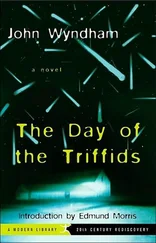‘But a mutant isn’t responsible for—’ I began.
‘“Isn’t responsible,”’ sneered the old man. ‘Is a tiger-cat responsible for being a tiger-cat? But you kill it. You can’t afford to have it around loose. Repentances says to keep pure the stock of the Lord by fire, but that’s not good enough for the bloody Government now.
‘Give me the old days when a man was allowed to do his duty and keep the place clean. Heading right for another dose of Tribulation we are now.’ He went on muttering, looking like an ancient and wrathful prophet of doom.
‘All these concealments — and they’ll try again for want of a proper lesson; women who’ve given birth to a Blasphemy just going to church and saying how sorry they are and they’ll try not to do it again; Angus Morton’s great-horses still around, an “officially approved” mockery of the Purity Laws; a damned inspector who just wants to hold his job and not offend them in Rigo — and then people wonder why we get tribulated seasons…’ He went on grumbling and spitting with disgust, a venomously puritanical old man….
I asked Uncle Axel whether there were a lot of people who really felt the way old Jacob talked. He scratched his cheek, thoughtfully.
‘Quite a few of the old ones. They still feel it’s a personal responsibility — like it used to be before there were inspectors. Some of the middle-aged are that way, too, but most of them are willing enough to leave it as it is. They’re not so set on the forms as their fathers were. They don’t reckon it matters much what way it’s done so long as the mutants don’t breed and things go along all right — but give them a run of years with instability as high as it is this year, and I’d not say for certain they’d take it quietly.’
‘Why should the deviation-rate suddenly get high some years?’ I asked him.
He shook his head. ‘I don’t know. Something to do with the weather, they say. Get a bad winter with gales from the south-west, and up goes the deviation-rate — not the next season, but the one after that. Something comes over from the Badlands, they say. Nobody knows what, but it looks as though they’re right. The old men see it as a warning, just a reminder of Tribulation sent to keep us on the right path, and they make the most of it. Next year’s going to be a bad one, too. People will listen to them more then. They’ll have a sharp eye for scapegoats.’ He concluded by giving me a long, thoughtful look.
I had taken the hint and passed it on to the others. Sure enough the season had been almost as tribulated as the one before, and there was a tendency to look for scapegoats. Public feeling towards concealments was noticeably less tolerant than it had been the previous summer, and it increased the anxiety we should in any case have felt over our discovery of Petra.
For a week after the river incident we listened with extra care for any hint of suspicion about it. We found none, however. Evidently it had been accepted that both Rosalind and I, in different directions, had happened to hear cries for help which must, in any case, have been faint at the distance. We were able to relax again — but not for long. Only about a month went by before we had a new source of misgiving.
Anne announced that she was going to marry….
There was a shade of defiance in Anne, even when she told us.
At first we did not take it very seriously. We found it difficult to believe, and we did not want to believe, that she was serious. For one thing, the man was Alan Ervin, the same Alan I had fought on the bank of the stream, and who had informed on Sophie. Anne’s parents ran a good farm, not a great deal smaller than Waknuk itself; Alan was the blacksmith’s son, his prospects were those of becoming the blacksmith himself in his turn. He had the physique for it, he was tall and healthy, but that was about as far as he went. Quite certainly Anne’s parents would be more ambitious for her than that; so we scarcely expected anything to come of it.
We were wrong. Somehow she brought her parents round to the idea, and the engagement was formally recognized. At that point we became alarmed. Abruptly, we were forced to consider some of the implications, and, young as we were, we could see enough of them to make us anxious. It was Michael who put it to Anne first.
‘You can’t, Anne. For your own sake you mustn’t,’ he told her. ‘It’d be like tying yourself for life to a cripple. Do think, Anne, do really think what it is going to mean.’
She came back at him angrily.
‘I’m not a fool. Of course I’ve thought. I’ve thought more than you have. I’m a woman — I’ve a right to marry and have children. There are three of you and five of us. Are you saying that two of us must never marry? Never have any lives or homes of our own? If not, then two of us have got to marry norms. I’m in love with Alan, and I intend to marry him. You ought to be grateful. It’ll help to simplify things for the rest of you.’
“That doesn’t follow,’ Michael argued. ‘We can’t be the only ones. There must be others like us — beyond our range, somewhere. If we wait a little—’
‘Why should I wait? It might be for years, or for always. I’ve got Alan — and you want me to waste years waiting for someone who may never come — or whom I may hate if he does. You want me to give up Alan, and risk being cheated of everything. Well, I don’t intend to. I didn’t ask to be the way we are; but I’ve as much right to get what I can out of life as anyone else. It isn’t going to be easy: but do you think I’d find it easier going on like this year after year? It can’t be easy for any of us, but it isn’t going to make it any better if two of us have to give up all hope of love and affection. Three of us can marry three of you. What is going to happen to the other two then — the two who’ll be on the outside? They won’t be in any group. Do you mean they ought to be cheated out of everything?
‘It’s you who haven’t thought, Michael — or any of you. I know what I intend to do: the rest of you don’t know what you intend to do because you’re none of you in love — except David and Rosalind — and so you’ve none of you faced it.’
That was partially true as far as it went — but, if we had not faced all the problems before they arose, we were well aware of those that were constantly with us, and of those the main one was the need of dissembling, of leading all the time a suffocating half-life with our families. One of the things we looked forward to most was relief some day from that burden, and though we’d few positive ideas how it could be achieved, we could all realize that marriage to a norm would become intolerable in a very short while. Our position in our present homes was bad enough; to have to go on living intimately with some one who had no thought-shapes would be impossible. For one thing, any of us would still have more in common with the rest and be closer to them than to the norm that he or she had married. It could not be anything but a sham of a marriage when the two were separated by something wider than a different language, which had always been hidden by the one from the other. It would be misery, perpetual lack of confidence, and insecurity; there’d be the prospect of a lifetime’s guarding against slips — and we knew well enough already that occasional slips were inevitable.
Other people seem so dim, so half-perceived, compared with those whom one knows through their thought-shapes; and I don’t suppose ‘normals‘, who can never share their thoughts, can understand how we are so much more a part of one another. What comprehension can they have of ‘thinking-together’ so that two minds are able to do what one could not? And we don’t have to flounder among the shortcomings of words; it is difficult for us to falsify or pretend a thought even if we want to; on the other hand, it is almost impossible for us to misunderstand one another. What, then, could there be for any of us tied closely to a half-dumb ‘normal’ who can never at best make more than a clever guess at anyone else’s feelings or thoughts? Nothing but prolonged unhappiness and frustration — with, sooner or later, a fatal slip; or else an accumulation of small slips gradually fostering suspicion….
Читать дальше












